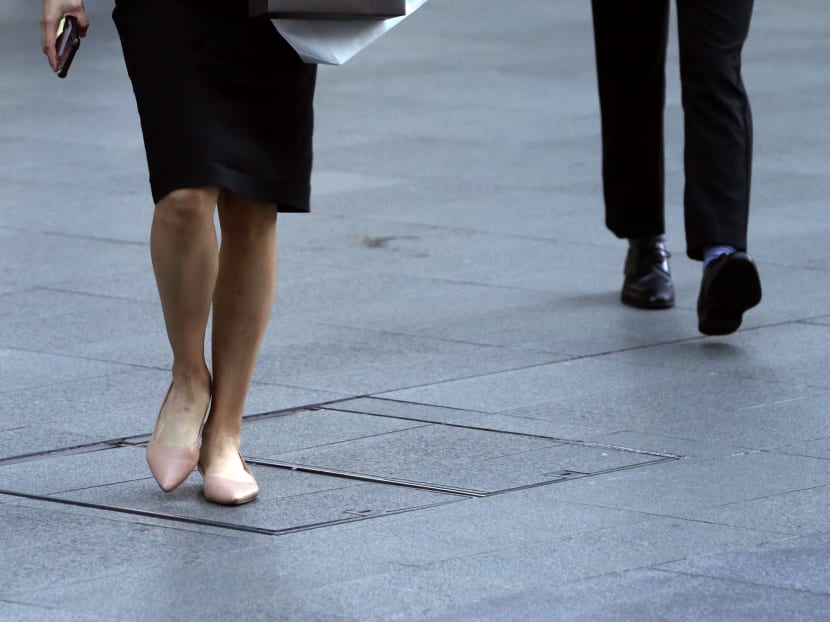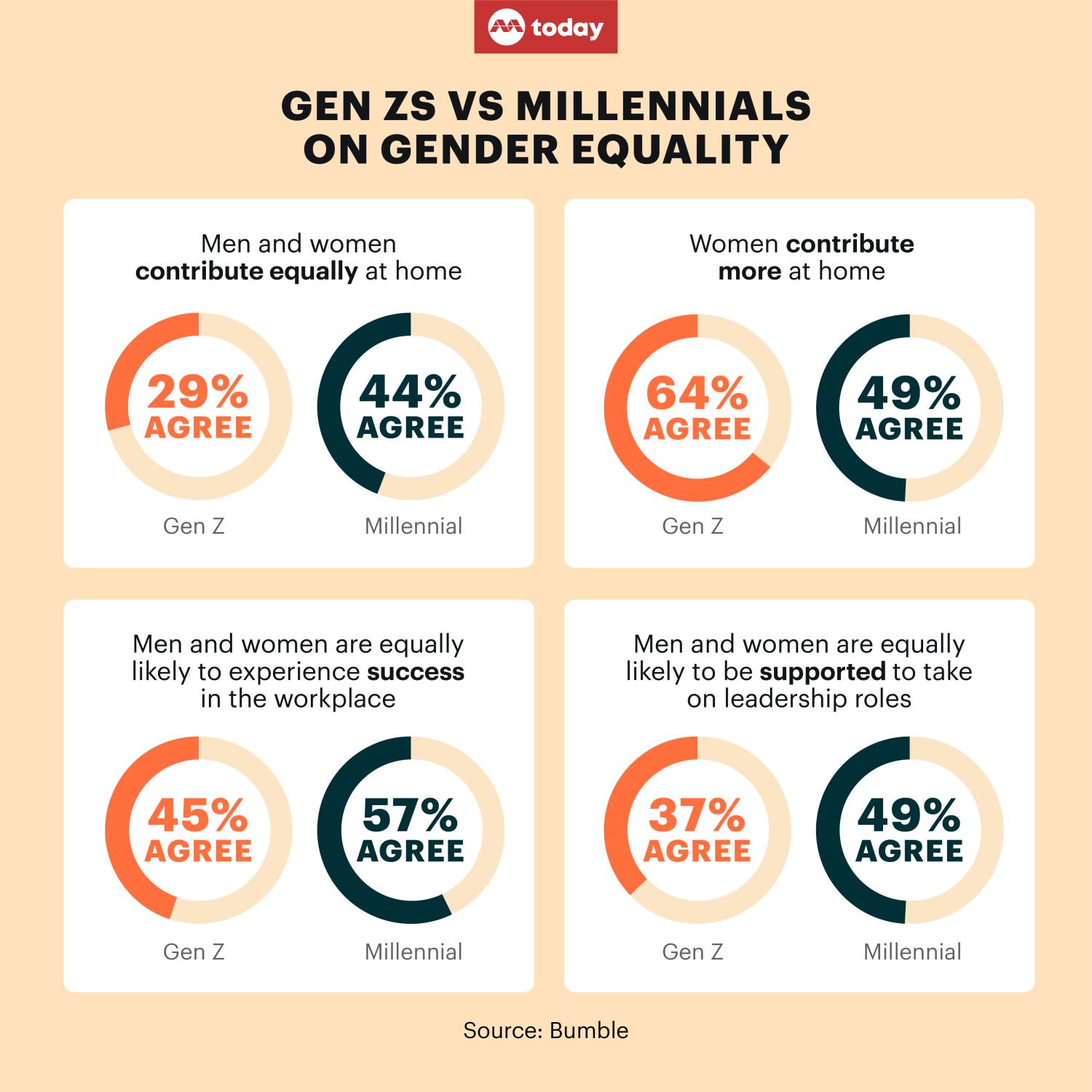More Gen Zers than millennials believe gender inequity a pressing issue, Bumble survey finds
SINGAPORE — Media professional Audria Low, 24, has many older female colleagues and bosses, and so she can see that in her chosen field at least, women can excel just as easily as men.

- A Bumble-commissioned survey found that Gen Z youths have “higher expectations towards gender equity” than millennials
- About three in 10 Gen Zers agree that men and women contribute equally at home, as compared to 44 per cent of millennials who feel the same
- Youths told TODAY that gender inequity persists in subtle ways at work and home
- This includes domestic chores falling on the shoulders of female family members
SINGAPORE — Media professional Audria Low, 24, has many older female colleagues and bosses, and so she can see that in her chosen field at least, women can excel just as easily as men.
But the same millennial colleagues often lament to her that the brunt of handling family logistics and caregiving duties in their homes falls on their shoulders, she said.
As a recent survey commissioned by dating app Bumble shows, many members of Generation Z, such as Ms Low, believe that gender inequity is still a pressing issue and that more should be done to balance the scales both at work and at home.
Indeed, the survey found that Gen Z youths have higher expectations towards gender equity than millennials and a slightly more pessimistic view than millennials of current levels of equality across genders.
The survey defined Gen Z as those aged between 18 and 26 and millennials as those between 27 and 42.
The survey, co-commissioned by the Young Women’s Leadership Connection, polled 1,000 Singaporeans aged between 18 and 42, and the findings were released on Saturday (Dec 2).
GEN Z LESS LIKELY TO BELIEVE GENDER EQUALITY EXISTS
The survey found that:
- Only 29 per cent of Gen Zers agree that men and women contribute equally at home, as compared with 44 per cent of millennials
- Over six in 10 Gen Z youths believe women contribute more at home, while five in 10 millennials believe the same
- Over half of Gen Z youths believe men are more likely to experience workplace success
- In contrast, almost six in 10 millennials believe both genders are equally likely to experience success at work
- Almost six in 10 Gen Z youths believe men are more likely to be supported to take on leadership roles
- Meanwhile, 49 per cent of millennials agree that either gender is equally likely to receive support for leadership advancement
Ms Natalie Thomas, a 27-year-old project manager, believes that Gen Zers are generally more socially conscious and engaged with current events because of social media, and thus likely to have a “keener awareness” of gender inequity than older generations.
While millennials might be more “jaded” about gender equality, Ms Thomas observed that there are many people of all ages “deeply committed to creating positive change”.
Meanwhile, 25-year-old university student Aamir Bana said factors such as life experiences, income and education are likely to affect the views of both millennials and Gen Zers.
Still, he agrees that younger men like himself are more aware of gender issues and are looking to educate themselves on the topic.
“I think what is clear is that people are now aware that motherhood is not free labour and consider it a precious job," he said.
"At the same time you have young people grappling with toxic masculinity and are striving to reconcile traditional notions of being a man with the reality that women are really no different."
Mr Bana said that he became more aware about gender inequity from reading feminist authors in university, which reinforced his observation of how his sister was given stricter curfews and fewer liberties at home than himself.

GENDER EQUALITY STARTS AT HOME
For some, like Ms Nazrana Shaheen, awareness about gender inequality begins at home.
The 20-year-old said that while she was growing up, she noticed more household chores being assigned to her and her sisters than to her brother.
This inequality is perpetuated through even simple tasks such as clearing up after oneself by washing plates and ironing one’s school uniform, said Ms Nazrana.
"As a small-sized female, I’ve always gotten comments like 'You’re not strong enough, let a male help', 'Once you get married, you have to take care of your husband’s food, clothes, and the house'."
Ms Nazrana is determined to ensure that in her relationship, she and her boyfriend are "equal".
She has had discussions with her boyfriend on how they plan to organise their future household.
They have both agreed that they will split the chores, be equally involved in raising a child and compromise to support each others' personal and career goals.
Ms Sheryl Teo, 24, who works in the performing arts, said that the “mental load” of domestic tasks still falls heavily on female members of the family.
“At both home and work, we are in a time where (gender inequity) is not so explicit but comes down to the mental load of who is conditioned and socialised to take on more responsibility,” she said.
She gave the example of male family members who may unconsciously leave dirty dishes on the table without thinking of putting them in the sink, or who is stepping up to do these chores.
Ms Teo added that more "traditional" ideas of gender norms can pass down the generations, as she has heard discussions among some recently married peers who joke about their "failings" as a wife due to an inability to perform certain domestic tasks.
While such comments may appear to be "innocuous and lightly self-deprecating", Ms Teo said they also reveal how easily even young people today assume gender norms imbued in the roles of husband and wife.
SUBTLE DIFFERENCES AT WORK
The Gen Z women who spoke to TODAY said that they had not experienced any gender discrimination at work yet, but they have observed that opportunities for their older female colleagues are more limited than men's.
“Perhaps it is the fact that I am still rather young so I am able to achieve the same career goals as my male colleagues. However, I have noticed more opportunities given to men as compared to women right after they have a child,” said Ms Nazrana, who is a social media executive.
Civil servant Gabriel Ng, 26, added that he has also observed that men and women are held to differing standards when it comes to how to present themselves at work.
“I do think gender affects how people are expected to carry themselves at work, or what persona might be most strategic or effective. For example, (the belief that) women need to be fiercer or sterner to command respect,” he said.
Mr Ng added that he now tries to be conscious of situations where he may experience conveniences and privileges because of his gender.
"I also try to be empathetic and attentive when people around me raise related issues, because it is crucial for such conversations to be more normalised," he said.
Even in female-dominated industries, some of the youths said that they notice gender inequality manifests in subtler ways — women often have to be on guard against harassment or have to meet cultural expectations of looking “pretty” when meeting clients, for example.
While she had not personally experienced gender-based discrimination at work, Ms Teo said it feels like “the risk of it is always there”, causing women to be “hyper-aware” of workplace interactions, especially with male colleagues.
“Not to view societal progress in a straight line, but we seem to not have made as much progress as one would like to believe,” she said.
“It's easy to make cosmetic changes and to say things like, ‘Oh, I respect women’ or ‘I think men and women are equal’, but that rarely is borne out in action and in daily life.”











